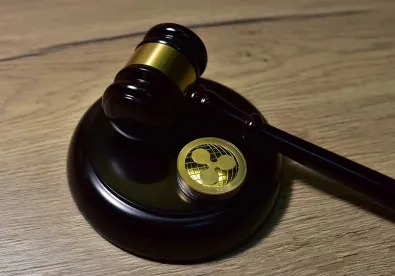In a recent and highly anticipated decision, a court in the Southern District of New York held that Ripple’s cryptocurrency token – XRP – is not inherently a security. In a setback to the SEC, the court also held that certain sales of XRP to retail investors through blind “bid/ask” transactions[1] were not securities transactions when considering the economic realities and under the totality of the circumstances. SEC v. Ripple Labs, Inc., et al.[2]
The court delivered its decision on these “programmatic sales” of XRP to retail investors, as well as its decisions on “institutional” and other types of sales of XRP, when ruling on competing summary judgment motions. Even though the court’s rulings were limited to the transactions at issue and could be appealed, its decision undermines the SEC’s current position that it requires no additional authority from Congress to regulate both sales of tokens and cryptocurrency trading platforms.
In its complaint, the SEC accused Ripple and two key executives of conducting unregistered securities transactions through the offers and sales of its XRP token. According to the SEC, Ripple engaged in three different categories of unregistered XRP offers and sales in violation of Section 5 of the Securities Act of 1933:
(1) “Institutional Sales” – direct sales pursuant to written contracts with counterparties (primarily institutional buyers, hedge funds, and “on-demand liquidity” customers);
(2) “Programmatic Sales” – sales of XRP on digital asset trading platforms “programmatically” so such sales did not exceed a certain percentage of XRP’s overall daily trading volume (think of these as retail sales to everyday investors); and
(3) “Other Distributions” – the distribution of XRP by Ripple and related third parties primarily as payment for services, such as employee compensation.
In reaching its decision, the court narrowly applied the U.S. Supreme Court’s well-known test in SEC v. Howey Co., 328 U.S. 293 (1946) to each category of sales, which outlines the standard for an “investment contract.” Under the Howey test, an investment contract is “a contract, transaction[,] or scheme whereby a person [(1)] invests his money [(2)] in a common enterprise[3] and [(3)] is led to expect profits solely from the efforts of the promoter or a third party.” 328 U.S. at 298-99.
In narrowly applying the Howey test to each category of sales, the court rejected the SEC’s so-called “embodiment theory” that the XRP token is inherently a “contract, transaction[,] or scheme” that embodies the Howey requirements of an investment contract. Instead, the court acknowledged the distinction to be made between many crypto assets themselves (at least those lacking the “ineluctable hallmarks” of a security[4]) and the “investment contracts” that can be created by the manner in which they are sold. In addition to undercutting the SEC’s embodiment theory, the court found it unnecessary to analyze whether “a digital asset that was originally offered in a securities offering” could “morph” and “later be sold in a manner that does not constitute an offering of a security.”
Even the SEC has since moved away from the “morphing” approach put forward by William Hinman, then Director of the SEC’s Division of Corporation Finance, in his now infamous 2018 speech. At its core, Hinman’s analysis looked to whether a token or coin is sufficiently “decentralized” so that a purchaser could not reasonably rely on a person or group to carry out managerial or entrepreneurial efforts. However, the court did not analyze the decentralization of the protocol—in fact, the word “decentralization” only appears once in the opinion.
Howey Analysis
As to Institutional Sales, the court determined that the first prong of the Howey test was satisfied because the Institutional Buyers invested money by providing fiat or other currency in exchange for XRP. The second prong was also met because each Institutional Buyer’s ability to profit was tied to Ripple’s fortunes and the fortunes of other Institutional Buyers because all Institutional Buyers received the same fungible XRP. Ripple used the funds from Institutional Sales to promote and increase the value of XRP. Therefore, when the value of XRP increased, all Institutional Buyers profited in proportion to their XRP holdings. Finally, the Institutional Buyers purchased XRP with the expectation that they would derive profits from Ripple’s marketing campaign and communications, thereby satisfying the third Howey prong. Accordingly, Institutional Sales constituted unregistered offers and sales of investment contracts in violation of Section 5 of the Securities Act.
Significantly, however, the court reached the opposite result with regard to retail Programmatic Sales and Other Distributions. With respect to Programmatic Sales, the court found that the third Howey prong – that profits are expected to be derived solely from the efforts of others – was not established. Unlike the Institutional Buyers, who reasonably expected that Ripple would use sales proceeds to improve the XRP ecosystem and increase the price of XRP, the Programmatic Sales were blind bid/ask transactions. Neither Ripple nor the Programmatic retail buyers knew the identity of their counterparty.
The court reasoned that Programmatic Buyers could not have reasonably relied on Ripple’s managerial efforts to generate profits because, among other things, (1) no Programmatic Buyer was aware they were buying XRP from Ripple and (2) many Programmatic Buyers were unaware of even the existence of Ripple. Moreover, Ripple’s Programmatic Sales represented less than 1% of the global XRP trading volume.
The court reached the same result with respect to the Other Distributions, albeit based on the first prong of the Howey test, not the third. The first prong requires an investment of money. Among other things, this category included employees and companies who received XRP from Ripple as compensation—which, in the court’s view, was not an investment of money by these individuals/companies in Ripple. Similarly, the court noted that the SEC had not alleged those receiving these Other Distributions were “underwriters” and that secondary market sales were offers and sales of investment contracts in which payments of money traced back to Ripple.
However, the ruling may be appealed to the Second Circuit Court of Appeals, likely with both parties cross-appealing. Therefore, it is important to remember that this federal district court ruling could be reversed on appeal. There is at least an argument that the result was inequitable, given that the result counterintuitively affords the protections of securities law to sophisticated institutional investors rather than to everyday retail investors. In addition, other courts may reach different results, particularly in other federal circuits. The eventual appeal will likely occur later, as the court said it will issue a trial setting for any remaining issues. But the Second Circuit could permit an interlocutory appeal, given the significance of the issues, which would expedite the appeal.
Although the court granted and denied relief requested by both parties, many in the cryptocurrency community view the court’s decision as a win for Ripple. Coinbase and Binance, also defendants in SEC enforcement actions, operate two of the world’s largest crypto trading platforms. If sales of XRP were not securities transactions when sold in blind bid/ask transactions on trading platforms, the SEC may face an uphill battle in convincing courts that sales of anonymously traded tokens on Coinbase and Binance constitute securities transactions.
FOOTNOTES
[1] Such trading platforms regularly facilitate blind ‘bid/ask’ transactions in tokens in which the buyer of the token does not know the identity of the seller.
[2] SEC v. Ripple Labs, Inc., 2023 U.S. Dist. LEXIS 120486, __ F.Supp.3d __, 2023 WL 4507900 (S.D.N.Y. July 13, 2023).
[3] The United States Circuits vary in what qualifies for commonality under the “Common Enterprise” element of the Howey test. Federal courts require that there be either horizontal or vertical commonality. See Revak v. SEC Realty Corp., 18 F.3d 81, 87-88 (2d Cir. 1994). But every United States Circuit accepts that horizontal commonality satisfies the second element of the Howey test. Horizontal commonality is “the tying of each individual investor’s fortunes to the fortunes of the other investors by the pooling of assets, usually combined with the pro-rata distribution of profits.” Id. Vertical Commonality can be divided into “broad” or “strict” vertical commonality, and some circuits use different standards to assess this type of commonality.
[4] This distinction was made by Lewis Cohen in The Ineluctable Modality of Securities Law: Why Fungible Crypto Assets Are Not Securities and an amicus brief supporting Ripple filed by Lewis Cohen and his colleague on behalf of Paradigm, a prominent venture capital fund manager.





 />i
/>i
